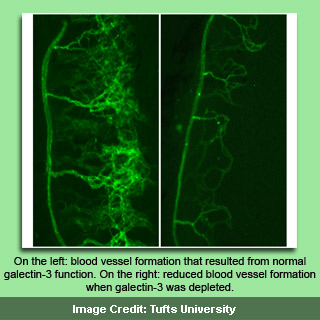
Some of the diseases triggered by overproduction of angiogenesis are age-related macular degeneration, cancer, and diabetes. So finding means to halt angiogenesis can possibly lead to treatment for such ailments. In order to fulfill the requirement of the body to expand its network of blood vessels, cells may release molecular signals. These molecular signals also termed as growth factors seemingly benefit angiogenesis.
“Our study shows that galectin-3 protein binds to glycans (carbohydrate portions) of specific cell-adhesion proteins, the integrins, to activate the signaling pathways that bring about angiogenesis. This improved understanding may provide a more targeted approach to preventing harmful angiogenesis,” alleged Noorjahan Panjwani, PhD, a professor in the department of ophthalmology at Tufts University School of Medicine and a member of the biochemistry and cell, molecular and developmental biology program faculties at the Sackler School of Graduate Biomedical Sciences.
The process expanding the network of blood vessels is claimed to be necessary for normal growth, development, and wound healing. But it can possibly result in harmful consequences when blood vessels supply tumors or other diseased tissue. It may also be detrimental when extreme blood vessel growth interferes on surrounding tissues. Galectin-3 protein is believed to boost angiogenesis. Therefore it can be a potential target for drugs blocking harmful blood vessel growth. Scientists revealed that till date the way galectin-3 promotes angiogenesis is not known.
Anna Markowska, a PhD student in the biochemistry program at the Sackler School of Graduate Biomedical Sciences at Tufts and the first investigator added, “We found that application of a galectin-3 inhibitor significantly reduced angiogenesis in mice. We also found that preventing galectin-3 from binding with the integrins reduced angiogenesis.”
By figuring out an accurate mechanism it is presumed that the way galectin-3 promotes angiogenesis will be uncovered. The mechanism can possibly open doors to another therapeutic target. Ascertaining the pathway can help determine more options for potential treatments.
The research was published online on August 16 in The Journal of Experimental Medicine.
